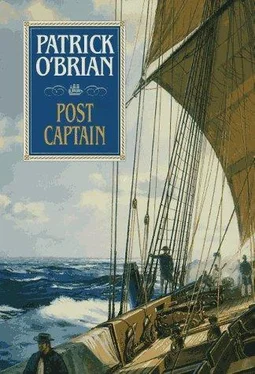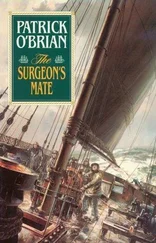Patrick O'Brian - Post captain
Здесь есть возможность читать онлайн «Patrick O'Brian - Post captain» весь текст электронной книги совершенно бесплатно (целиком полную версию без сокращений). В некоторых случаях можно слушать аудио, скачать через торрент в формате fb2 и присутствует краткое содержание. Жанр: Книги. Описание произведения, (предисловие) а так же отзывы посетителей доступны на портале библиотеки ЛибКат.
- Название:Post captain
- Автор:
- Жанр:
- Год:неизвестен
- ISBN:нет данных
- Рейтинг книги:5 / 5. Голосов: 1
-
Избранное:Добавить в избранное
- Отзывы:
-
Ваша оценка:
- 100
- 1
- 2
- 3
- 4
- 5
Post captain: краткое содержание, описание и аннотация
Предлагаем к чтению аннотацию, описание, краткое содержание или предисловие (зависит от того, что написал сам автор книги «Post captain»). Если вы не нашли необходимую информацию о книге — напишите в комментариях, мы постараемся отыскать её.
Post captain — читать онлайн бесплатно полную книгу (весь текст) целиком
Ниже представлен текст книги, разбитый по страницам. Система сохранения места последней прочитанной страницы, позволяет с удобством читать онлайн бесплатно книгу «Post captain», без необходимости каждый раз заново искать на чём Вы остановились. Поставьте закладку, и сможете в любой момент перейти на страницу, на которой закончили чтение.
Интервал:
Закладка:
He was still asleep when the hands were piped to dinner, sleeping still when the gun-room sat down to its gammon and spinach, and for the first time Stephen saw all the Polychrest’s officers together - all except for Pullings, who had the watch, and who was walking the quarterdeck with his hands behind his back, pacing in as close an imitation of Captain Aubrey as his form could manage, and remembering, every now and then, to look stern, devilish, as like a right tartar as possible, in spite of his bubbling happiness. At the head of the table sat Mr Parker, an acquaintance of some days’ standing, a tall, spare, disapproving man, rather good-looking, apart from the expression on his face; then the lieutenant of Marines in his scarlet coat, a black-haired Scotsman from the Hebrides whose face was so marked by the smallpox that it was difficult to make out what habitual expression it might wear; he had a very well-bred turn, however; and Macdonald was his name. Mr Jones the purser, his neighbour, was also a black man, but there the likeness stopped; the purser was a drooping little flaccid man with pendulous cheeks either side of a fleshy red mouth; his face was the colour of cheese, and this uniform pallor swept up his high forehead to a baldness that reached from ear to ear. His straight hair grew only in a fringe round this pool, hanging some way down his neck, and in whiskers; yet a strong beard showed blue on his waxy cheeks, a very powerful growth. His appearance was that of a small shopkeeper; but there was little time to judge of his conversation, for at the sight of his plate he started from the table with a watery belch, rushed staggering to the quarter-gallery, and was seen no more. Then there was the master, still yawning from his morning watch. He was a slight, elderly, grizzled man with bright blue eyes, and he said little as he set to his table at the beginning of the meal: Stephen was habitually silent; the others were feeling their way with their new messmates, and their knowledge that the surgeon was the captain’s particular friend acted as a further check.
However, as Stephen’s appetite waned, so his desire for information increased, and laying down his knife and fork he said to the master, ‘Pray, sir, what is the function of the curious sloping metal-lined cylindrical place immediately in front of my store-room? What is its name?’
‘Why, Doctor,’ said Mr Goodridge, ‘what to call it I do not rightly know, other than an abomination; but the ship-wrights spoke of it as the combustion-chamber, so I take it it was where the secret weapon was stowed. It used to lead out on deck where the fo’c’sle is now.’
‘What kind of a secret weapon?’ asked Macdonald.
‘Something in the nature of a rocket, I believe.’
‘Yes,’ said the first lieutenant, ‘a kind of enormous rocket without a stick. It was the ship that was to be the stick, and those levered chutes for shot were intended to bring her by the head or by the stern for elevation: the weapon was calculated to destroy a first-rate at the distance of a mile, but it had to be amidships, to counteract the roll, and that was the reason for the system of lateral keels and rudders.’
‘If the rocket was the calibre of the chamber, then the recoil must have been prodigious,’ said Macdonald.
‘Prodigious,’ said Mr Parker. ‘That was why the sharp stern was imagined, to prevent the sudden thrust destroying her bottom - the whole ship recoiled, whereas a square stern, by resisting, would be crushed. Even so, they had to put a mass of timber where the stern-post should be, to take the first impact.’ A very exalted personage had been present at the experimental firing that had cost the inventor his life, and he had told Mr Parker that the ship had darted back her whole length, at the same time being pressed down in the water as far as her wing-transoms. The exalted personage had been against it from the start; Mr Congreve, who went down with the party, had said it would never answer; and it had not answered - these innovations never did. Mr Parker was against any break with tradition; it would never answer in the Navy; he did not care for these flint-locks for the guns, for example; although indeed they took a fine polish, and looked well enough, for an inspection.
‘How did the poor gentleman come to be killed?’ asked the master.
‘It seems that he would light the fuse himself, and as it hung fire, he put his head into the chamber to see what was amiss, when it exploded.’
‘Well, I am sorry for him,’ said Mr Goodridge. ‘But if it had to be, it might have been as well if he had sent the ship to the bottom at the same time. A cranker, more unseaworthy craft I never saw, and I have seen a mort in my time. She made more leeway than a common raft between St Helen’s and the Bill, for all the sharp floor and sliding keels, and she gripes like a man-trap. Then she goes and misses stays in a mill-pond. There is no pleasing her. She reminds me of Mrs Goodridge - whatever you do is wrong. If the captain had not box-hauled her in a flash, why, I don’t know where we might have come to. A most seamanlike manoeuvre, I must say; though I should not have ventured it myself, not with such a ragamuffin crew. And indeed she had more sternway upon her than I should have thought possible. As you say, sir, she was built to recoil, and I thought she was going to go on recoiling until we were brought up all standing on the coast of France. A crinkum-crankum piece of work, in my opinion, and ’tis the Lord’s blessing we have a right seaman in command; but what even he will do, or what the Archangel Gabriel would do, if it comes on to blow, I do not know, I am sure. The Channel is not so broad as all that; and in point of searoom, what this here craft requires, is the great Southern Ocean, at its widest part.’
The master’s words were prompted by the Polychrest’s increasing roll; it sent the bread-barge careering over the table, and a midshipman into Jack’s cabin, with the news that the wind was shifting into the east, a little mouse-like child, stiff in his best uniform, with his dirk at his side -he had slept with it.
‘Thank you, Mr - ’said Jack. ‘I do not believe I remember your name.’
‘Parslow, sir, if you please.’
Of course. The Commissioner’s protégé, a naval widow’s son. ‘What have you been doing to your face, Mr Parslow?’ he asked, looking at the red, gaping, lint-flecked wound that ran across that smooth oval cheek from ear to chin.
‘I was shaving, sir,’ said Mr Parslow with a pride he could not conceal. ‘Shaving, sir, and a huge great wave came.’
‘Show it to the doctor, and tell him, with my compliments, that I should be glad if he would drink tea with mc. Why arc you in your number one rig?’
‘They said - it was thought I ought to show an example to the men, sir, this being my first day at sea.’
‘Very proper. But I should put on some foul-weather clothes now. Tell me, did they send you for the key of the keelson?’
‘Yes, sir; and I looked for it everywhere. Bonden told me he thought the gunner’s daughter might have it, but when I asked Mr Rolfe, he said he was sorry, he was not a married man.’
‘Well, well. You have foul-weather clothes?’
‘Why, sir, there are a great many things in my chest, my sea-chest, that the shopman told Mama I should be equipped with. And I have my father’s sou-wester.’
‘Mr Babbington will show you what to put on. Tell him with my compliments, that he will show you what to put on,’ he added, remembering that gentleman’s inhuman barbarity. ‘Do not wipe your nose upon your sleeve, Mr Parslow. It ain’t genteel.’
‘No, sir. Beg pardon, sir.’
‘Cut along then,’ said Jack irritably. ‘Am I a Goddamned wet nurse?’ he asked his pea-jacket.
Читать дальшеИнтервал:
Закладка:
Похожие книги на «Post captain»
Представляем Вашему вниманию похожие книги на «Post captain» списком для выбора. Мы отобрали схожую по названию и смыслу литературу в надежде предоставить читателям больше вариантов отыскать новые, интересные, ещё непрочитанные произведения.
Обсуждение, отзывы о книге «Post captain» и просто собственные мнения читателей. Оставьте ваши комментарии, напишите, что Вы думаете о произведении, его смысле или главных героях. Укажите что конкретно понравилось, а что нет, и почему Вы так считаете.












